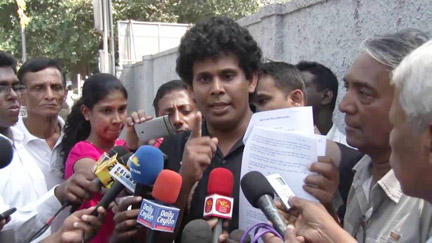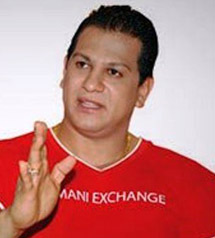|
The revolution inaugurated on January 8 through the
ballot has to continue:
Dismantling the Mafia state in Sri Lanka
by Kumar Rupasinghe
The inauguration of Maithripala Sirisena as the President of Sri
Lanka, promising a 100-day program to abolish the Executive Presidential
system, and promulgate a Freedom of Information Act among other things,
gave rise to expectations that all this will pave the way for a more
transparent society where citizens will be protected by the law. Would
it be wrong to say that Sri Lanka experienced its mini Arab Spring a few
months ago?
 |
|
Recent revelations have
brought to light many manifestations of a Criminal State,
following information coming from the officials and public.
Pic courtesy: Youtube.com |
Large numbers of people rallied, held demonstrations and agitated to
overthrow President Mahinda Rajapaksa, who had assumed the status of the
uncrowned King of Sri Lanka. Our Arab Spring was successful and the
people overthrew the King through the ballot!
However, it is important that we learn the lessons from the
experiences of the Arab Spring in the Middle East, where over a short
period of time despotic regimes have again gained control of most
states. The lesson to be learnt from the failure of the Arab Spring is
that the people relaxed, stopped the demonstrations and went home. But,
the counter revolution took place which restored the Mafiosi in many
countries.
The lesson that follows from this experience is that the revolution
which was inaugurated through the ballot has to be continued, and the
politically conscious people of this country should be ever vigilant!
Enrich
To achieve this objective, President Maithripala Sirisena must
dismantle the Mafia state in Sri Lanka. It is important that we take
note that in 1958, the former Prime Minister S.W.R.D. Bandaranaike was
assassinated by a bhikkhu at the behest of the local Mafia when the
Prime Minister refused to give shipping concessions to a company owned
by another bhikkhu!
In Mafia states, government officials enrich themselves and their
families and friends while exploiting the money, muscle, political
influence, and global connections of criminal syndicates to cement and
expand their own power. Indeed, top positions in some of the world's
most profitable illicit enterprises are no longer filled only by
professional criminals; they now include senior government officials,
legislators, spy chiefs, heads of police departments, military officers,
and, in some extreme cases, heads of state or their family members.
|

Former MP Duminda Silva was recently questioned by the Criminal
Investigation Department over alleged drug trafficking in
connection with drug king-pin Wele Suda. Pic courtesy: wurst.com |
Money Laundering occurs when proceeds from crime can be easily
concealed. Problems arise, however, when the criminal wishes to spend
his ill gotten gains without the fear of having to reveal the original
source. Thanks to the ingenuity of the Mafia, this problem has been
solved through "Money Laundering".I hope that the theoretical basis of a
Mafia state will be a useful concept for study and elaboration. What is
now required is to dismantle the criminal character of the state in all
its manifestations.
Criminal State
My purpose in this essay is to examine the evolution of the state in
Sri Lanka as a Criminal State, where over time the state has become a
vehicle for plunder and pillage, where it has become a vehicle for money
laundering and facilitating narco-trafficking and other insidious
crimes.
A good definition of a Criminal State is yet to be found in
literature although it is acknowledged that significant numbers of
States in the world are Criminal States. I, therefore, will use my own
definition. A criminal state is one which manipulates the law of the
land for the purpose of plunder and uses criminal behaviour to achieve
its objectives.
In previous articles, I have used the concept of a "defective state"
to characterize the evolution of the state in Sri Lanka. A defective
state evolves with patron - client relationships, where electoral
politics enhance and strengthen the patron - client relationship between
the ruler and the ruled. Patronage is dispensed through the evolution of
state-centric development structure with the state becoming the
principled patron of the population.
Through this system, the state sector expands inexorably, where all
appointments are through the patronage of the President and the
Ministers and MPs. Over time, the entire system is corrupt to the core.
Corruption is all pervasive in Sri Lanka, whether it is within the
State system or in business. Transactions, whether it is for providing a
job, or a contract for construction, or any other business, require a
bribe or a commission. With the transition to a Presidential system not
accountable to Parliament, the conditions were set for the evolution of
a Criminal State.
Narco-trafficking
With the advent of the war, the LTTE, with its own practice of
criminal behaviour, expanded inexorably. The litany of the crimes which
were committed from using civilians as hostages and as a human shield,
to the use of suicide squads, conscripting children and, developing a
massive organization for narco- trafficking to money laundering are,
today, the subject of an inquiry by the United Nations Human Rights
Council.
In combatting the terror machine of the Liberation Tigers of Tamil
Eelam, the State developed its own methods of combatting terrorism, such
as extra-judicial killings, and, through the Prevention of Terrorism
Act, many arbitrary actions were committed. Recent revelations after the
Presidential elections, have brought to light many manifestations of a
Criminal State.
Robbery
The Mafia State in Sri Lanka has the following features:-
1. Robbery of State resources: From anecdotal evidence, it is clear
that there has been a massive robbery of state resources. They range
from the abuse of funds used for election purposes, to the use of state
funds for the appropriation of the former ruling party.
2. The narco-trafficking Mafia: It is a well known fact that Sri
Lanka is a transit hub for narco- trafficking. A well researched book by
Robert Kaplan, called Monsoon, which has a chapter on Sri Lanka,
suggests that Sri Lanka has become a central link in a chain of narco-trafficking,
starting from Afghanistan, to Pakistan, through India, Sri Lanka, and
Thailand to Burma. It is well known that customs officers are powerless
when they are ordered to release stocks of heroin from the customs
office. It is also well known that the narco Mafiosi were well connected
to the previous regime.
3. Money laundering: It is also well known that money laundering is a
daily occurrence in the country. It is alleged that Malaysian and Indian
black money is transited through the Central Bank of Sri Lanka.
4. Money deposits in foreign countries: The current investigation on
foreign deposits have unveiled how large sums of ill gotten gains have
been transferred illegally. Snippets of information that come to us
demonstrate that Seychelles is one of the hubs to which this money
initially flows. It is also alleged that money is stored in banks in
Uganda and South Africa and other offshore sites in the world. The
Government of India took quick action to confiscate Indian money
deposited abroad and to bring them back to the country.
5. Land frauds: The scale and extent of land frauds is immense.
Citizen's lands and houses have been appropriated by the Mafia and
people thrown to the streets. The Mafia has ways and means to change the
land titles in the Land Registry, and the citizen has no chance to
regain their land. In the North the scale and extent of appropriation of
land from citizens is huge. These lands are appropriated for building
golf courses, hotels, airports and for the use of the military. Citizens
have no means of reclaiming their land or obtaining compensation. A
similar situation exists in the South.
Politicians
Dismantling a Criminal State will not be easy when corrupt practices
remain a norm in Sri Lanka. It starts with the politicians, who argue
that they have to find large sums of money for the elections and as a
result have to earn the money for the next elections. Thus the MP uses
his powers of patronage for illicit bribes.
This happens from the local government level to the Ministers, Prime
Minister and the Presidency. Corruption is all pervasive within the
state sector where citizens have to bribe their way to get things done.
The Judiciary is also seemingly seriously corrupt at various levels.
Even Chief Justices and ordinary Judges are suspected of soliciting
bribes for a friendly dispensation. This is also true of the Police
force. The Stock Exchange was seized by the Mafia. It would seem that
the Mafia has penetrated the entire system.
In dismantling the corrupt system, a systematic analysis of the
nature of the Criminal State and its scale and extent will have to be
undertaken. When establishing Commissions of inquiry into money
laundering, hedge fund frauds, narco-trafficking and other criminal
acts, financial experts who have a knowledge of these subjects are
required and international assistance will have to be sought. In tracing
the bank deposits which are held in off-shore banks, the assistance of
the United States and other governments of destination countries,
Interpol and computer experts will be needed.
In any case, the citizens of the country should remain vigilant and
establish their own watchdog committees to ensure that Justice is seen
to be done. |

